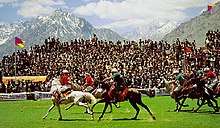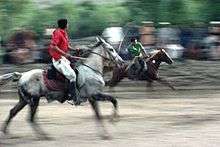Shandur Polo Festival
Shandur Polo Festival (Urdu: شندور میلہ) is one of the big festivals in Pakistan. This festival is held from 7 to 9 July every year on Shandur Pass in Chitral District of Khyber PakhtunkhwaThe polo match is played between the teams of Chitral District and districts of Gilgit-Baltistan, is a free style game.[1][2]
| Shandur Polo Festival شندور میلہ | |
|---|---|
 A Polo match at Shandur |
The Festival
The initiation of Polo in Shandur is credited to The balti raja of Skardu; Ali Sher Khan Anchan who built the polo ground of Shandur as well.[3] Shandur invites visitors to experience a traditional polo tournament which since 1936 has been held annually[4] in the first week of July between the local teams of Gilgit and Chitral. Organized and financed by the Tourism Corporation of NWFP, the tournament is held on Shandur Top, the highest polo ground in the world at 3,700 meters (the pass itself is at 3,800 meters). The festival also includes Folk music, dancing and a camping village is set up. The polo tournament is featured in the first episode of Himalaya with Michael Palin.
Various teams of Chitral and Gilgit-Baltistan have always played the game of polo closest to its original form. During the early 20th century, the British in neighboring India were the patrons of the game.[5]
Free-styled mountain polo is arguably polo in its purest form. This version of the game played at Shandur-Top has attained legendary status and is of great interest to international and domestic adventure tourists alike. There are no umpires and there are no holds barred. The rules are: There are no rules! In "The Roof of the World" Amin/Willets/Tetley write: "by comparison, an American Wild West rodeo might pass for choir practice." As one player once mentioned: "You can ride head-on into the opponent, if you dare."

In order to decide the final teams to play at the Shandur Polo Festival, preliminary matches are played both in Chitral and Gilgit, in which the best horses and players are chosen for the final games by the local juries. The festival begins on 7 July. During the course of the tournament A, B, C and D teams of Chitral and Gilgit. battle it out on the polo field. Each team has six members with 2-4 reserve players in case of injury etc. The match duration is usually one hour. It is divided into two halves, with a 10 minutes interval. During intervals, the locals enthrall the audiences with traditional and cultural performances. The game decided in favour of the team scoring more goals. The final is held on 9 July.
The field measures about 200 meters by 56 meters (normal polo field is about 270m by 150m), with 60 cm high stone walls running the length of the field on both sides instead of boards. As six players make up one side, the field can get fairly crowded. This has the advantage of slightly slowing down the pace, which, all things considered, is probably somewhat safety-enhancing. Players rarely wear helmets, The horses' legs often have no bandages, and mallets often have no grips or straps.
Historical background
The initiation of polo in Shandur is credited to The balti raja of Skardu; Ali Sher Khan Anchan who built the polo ground of Shandur as well.[6][7][8] but the initiation of Polo in Shandur is credited to the British occupiers who made possible the building of the polo ground. It is said that in 1935, UK Administrator for Northern Areas Evelyn Hey Cobb asked Niat Qabool Hayat Kakakhel to make a well-constructed polo ground in Shandur. He constructed a polo ground with the help of the people. This polo ground was later on named as "Mas Junali". The word "Mass Junali" is derived from Khowar language. The word "Mas" means moon and "Junali" means polo ground. Cobb was impressed by Kakakhail's resourcefulness and efficiency and wished to reward him for his service, but Kakakhail refused to accept any reward for his work. Instead, for the common benefit, Kakakhail asked Cobb to bring trout to stock the local streams. Cobb ordered live trout from England and dropped them into the Ghizer River. Due to this service, the Directorate of Fisheries was established and hundreds of people were employed. Now the weight of those fishes in Hundarap Lake reach 24 kg and in Baha Lake Khukush Nallah, their weight reached 40 kg.[9]
So Mas Junali became a source of relation between the people of Chitral District in Khyber Pakhtunkhwa and neighbouring Gilgit-Baltistan. Many people from around the world come to watch polo match played between Chitral District and Ghizer District.[10]
Polo at the Peak
Passion for polo will be the highest on the world’s highest Polo ground. Every year, Shandur invites visitors to experience a traditional polo tournament between the teams of Chitral and Gilgit from 7 to 9 July. The festival also includes folk music, folk dance, traditional sports and a camping village is set up on the pass.[11]
Polo is an equestrian sport with its origin embedded in Central Asia dating back to the 6th century BC.[12]
References
- "Shandur Polo Festival". www.tnn.com.pk. Retrieved 18 July 2018.
- "Held on 7th to 9th July". Pamirtimes.net. Retrieved 18 July 2018.
- Israr-ud-Din. Proceedings of the Third International Hindu Kush Cultural Conference. Oxford University Press, 2008 - Reference - 540 pages.
- Ground Effect - an excerpt from T. Mulliner's book Long Ride for a Pie Archived 2012-02-20 at the Wayback Machine ISBN 1-86966-135-4
- https://www.youtube.com/watch?v=ZXm-PdF24Uo
- Dawn. "GILGIT: Scouts accused of expanding encroachments".
- pakistan tour and travel. "shandur festival".
- express, tribune. "Rumble on the roof of the world".
- The Pakistan Journal of Forestry. Pakistan Forest Institute. 1 January 1973.
- "Polo Match being played between the teams of Ghizer and Laspur".
- Ground Effect - an excerpt from T. Mulliner's book Long Ride for a Pie,. ISBN 1-86966-135-4. Archived from the original on 20 February 2012.
- Polo (Game of King or King of Game), arose in Persia. pp. Polo is an equestrian sport with its origin embedded in Central Asia dating back to 6th century BC.
Further reading
- Khan, Aurangzaib. "How teams compete for the Shandur Polo Festival". Herald.